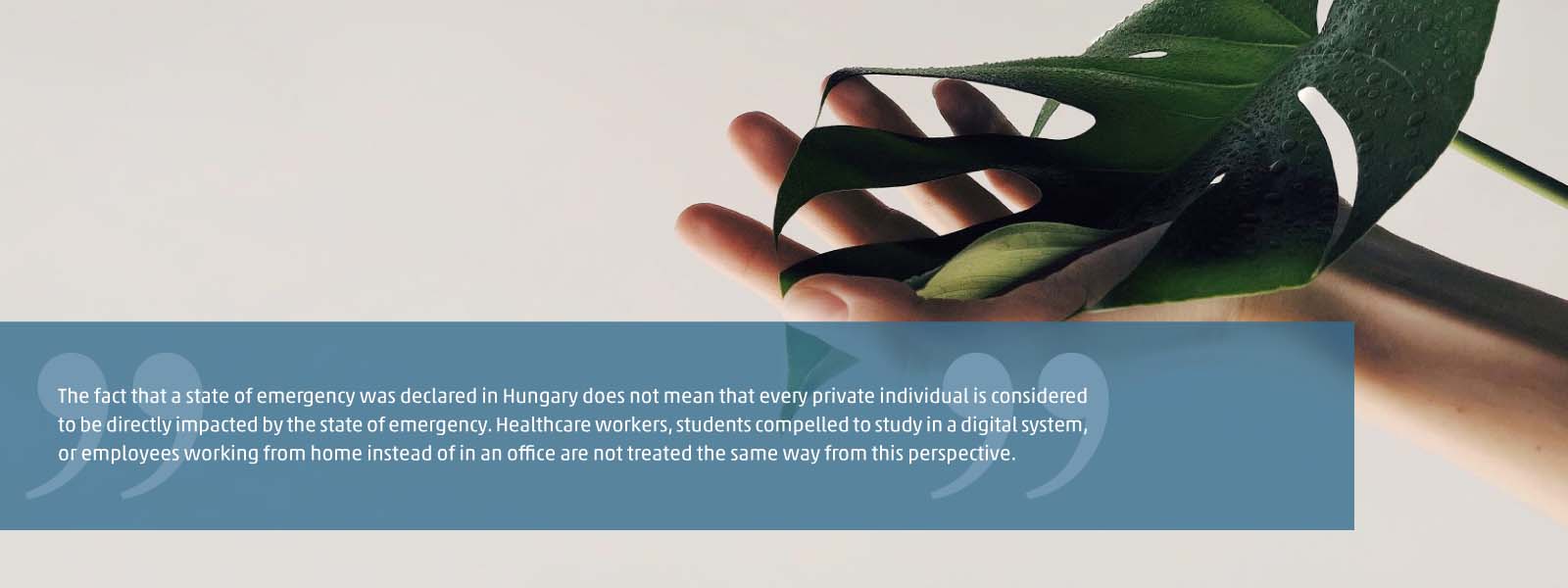On 12 May the Hungarian Ministry of Finance and the National Tax and Customs Administration (NAV) published very detailed information about the evaluation of the taxation aspects regarding the supply of goods and services free of charge offered in relation to protection against the coronavirus pandemic (available in Hungarian here). The Hungarian tax profession has been eagerly awaiting the information too, since donations have frequently been made in the last two months, and the need for them may probably continue for those in need. However, we must be aware of the tax consequences of the supply of goods and services free of charge, such as protective equipment distributed for employees. For a business with a large headcount, it really matters how a large free benefit is “assessed” at a subsequent tax inspection. It is possible that a benefit considered tax-exempt in fact qualifies as a wage cost. Below we take a close look at the key findings of the opinion.
Special regulation for supply of goods and services free of charge during state of emergency
Due to the coronavirus pandemic the Hungarian government declared a state of emergency for the entire country on 11 March 2020. In light of this, besides the tax laws related to the classification of free benefits, the regulations of Act CXCIV of 2011 on the Economic Stability of Hungary (Stability Act) also became applicable.
Pursuant to the Stability Act, any services or goods supplied free during the period of a disaster for people impacted by the disaster with the purpose of averting or mitigating the consequences of the disaster is considered an activity which the legal entity conducts as part of its business and economic activities. No tax payment liability arises if the entity reports this to the tax authority within 60 days that is competent regarding the payment obligation, and provides information on the description of the supplied service or goods and their quantities (it is worth remembering here that the state of emergency started on 11 March). No standard form is available for this report. It can be submitted in any format, by post or on the e-Papír app, with reference to the Stability Act. The 60-day deadline starts on the day the free supply is performed, with the provision that if it is a continuous supply, then the deadline starts from the day of the last delivery. To facilitate compliant reporting, the Hungarian Tax and Customs Administration will publish a sample reporting form on its website.
According to information from the NAV, the applicability of the Stability Act must be reviewed on a case-by-case basis, and the proper exercise of rights must be adhered to during the review. The fact that a state of emergency was declared in Hungary does not mean that every private individual is considered to be directly impacted by the state of emergency. Healthcare workers, students compelled to study in a digital system, or employees working from home instead of in an office are not treated the same way from this perspective.
Personal income tax
Compliance with the conditions set forth in the Stability Act must be examined on a case-by-case basis with regard to personal income tax too, and the reporting obligation must be considered when claiming tax-exemption as per the act too.
Healthcare
Disinfectants, masks, free shared car use and meals granted free of charge as well as accommodation provided cost-free for healthcare workers to facilitate their work during the state of emergency can be supplied free of tax.
Education
Providing laptops for students who are compelled to study under the digital education system due to the pandemic may comply with the rules of the Stability Act (for instance if a student is unable to study without the device). Private individuals who lost their jobs as a result of the state of emergency can be classified in a similar way, and providing a laptop for them could facilitate their retraining and re-employment.
Office work
For devices and products provided for employees carrying out their office work from their “home offices”, the application of the exemption rule is limited. For example, giving a laptop to an advisory-firm employee working from home (transferring ownership of the device) will most probably not help directly to avert and mitigate the disaster, while the person receiving the benefit may not necessarily be considered a person directly impacted by the disaster, so in this case the exemption rule cannot be applied. This is because transferring ownership of the laptop is not justified, since they can work just by being able to use the laptop too (use, however, is not taxable).
Commerce
If, for instance, an employer operating a retail store makes the wearing of masks and other protective equipment compulsory for its employees to prevent the spread of the virus, and supplies these free of charge, then no taxable income is generated for the employees with regard to this benefit in the given pandemic. If the same business places masks at the entrance and obliges its customers to wear them, the free supply of the masks does not entail a tax liability since the private individuals do not acquire the masks as assets with a purchase price and value, and they are freely available (without charge) for anyone (present in the store).
Corporate tax and small business tax
To treat expenses arising during the state of emergency as eligible costs, the above-mentioned statement must be submitted to the competent Hungarian tax authority.
The state of emergency conditions are not met with regard to the benefit:
- If the free benefit is received by the employee or the relative of an employee of the company (for instance the employer provides computer devices for the digital education of its employees) and this is recognised as other staff costs from an accounting perspective, the expense is an eligible cost under the CDT Act (i.e. deductible for tax purposes).
- If the person receiving the benefit is not an employee or a relative of an employee (private individual), then Appendix 3 of the CDT Act must be applied for classification as an eligible cost.
If the supply of goods and services free of charge is connected to the state of emergency, though not received by a private individual, but by an organisation (such as a company, a foundation, an association, a public institution), the deductibility may also be based on the Stability Act. If the conditions are fulfilled, the tax base does not have to be increased. For benefits not related to the state of emergency, the circumstances must be reviewed separately for each case since the deductibility of the cost may depend on who the beneficiary is.
Value added tax
In the Hungarian system of value added tax a complex analysis must be conducted with regard to the legal status of the provider (taxpayer or not, VAT-exempt or not), the beneficiary (exposed or not), and the detailed rules applicable for the benefit (definition of low-value gift, public donation, range of products ruling out tax-deduction right, etc.) to establish whether the benefit is subject to VAT and whether the VAT of the related acquisitions is deductible.
The Stability Act is applicable for VAT, which means that the supply of goods and services free of charge entails no VAT payment obligation if compliant (the reporting obligation, however, should not be forgotten here either). Exercising the right to deduct VAT with regard to the supply of goods and services free of charge must be reviewed individually for each case (supplies where VAT is not deductible anyway, e.g. hot meals, may not be subject to any VAT deduction under the state of emergency either, and the supplies of goods and services connected to the acquisitions must be recognised as taxable transactions anyway).
If a similar supply of goods and services free of charge has occurred at your company too in the last two months, we recommend you thoroughly review the taxation consequences. If you need an expert for the complex review, feel free to contact the tax advisory team of WTS Klient Hungary!











